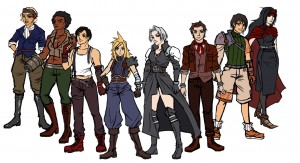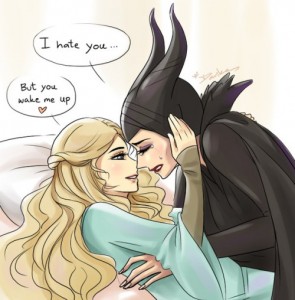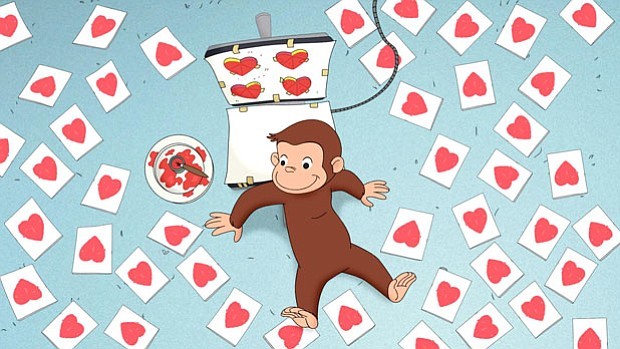“Real writers don’t write fanfiction and slash,” is a phrase that blows through the internet echo chamber with some regularity. For some people they’ve internalized that thought so deeply, that when they hear that bit of received “wisdom” they simply nod their heads and think nothing of it. What I’ve come to find is that that way of thinking about anything leads to a sort of close mindedness that really flies in the face of a bon vivant attitude. What I came to discover is that slash and fanfiction are not just some odd fringe of the sexy part of the internet. Instead I found a deeply committed community that truly loves the material they create and the different outlets it affords them. And yes, “real writers” do write it.
Slash and Burn
First though let’s explain what exactly fanfiction and slash actually are. Fanfiction is written stories and art where characters and settings from a piece of popular media is used instead of original characters. An example might include writing about Harry Potter being an Auror after graduation, or blending universes like Mulder and Scully being fired from the FBI and joining the Keystone Cops. It can be serious, comic, or sexy and include everything in between.

Slash fiction is a distinct flavor of fanfiction where the focus is on sex. More often than not, slash refers explicitly to male pairings. It received this odd convention due to one of the original slash pairs – James T Kirk and Spock. The stories were categorized on early usenets as Kirk/Spock (pronounced in the real world as Kirk Slash Spock). The way that it’s written is apparently important, since the first character in the list is the “Top” as it is known. So Kirk/Spock will be different from Spock/Kirk, and people might develop a preference one way or the other. Different pairings such as Frodo/Sam, Han/Obi-Wan, Watson/Holmes etc, all used that specific nomenclature, with the “slash” being the part that signalled the content of the stories.
For types of stories that feature women instead, the popular term is Femslash. It uses the same sort of labeling (Emma Swan/Evil Queen, Elsa/Jasmine, etc) but obviously the content is different. It also has a different readership that includes a majority of LGBT women and far fewer predominantly heterosexual ones.
This is where subcultures come from. So I had to know, other than the obvious, what makes Slash different than fanfiction? Sometimes the guide needs a guide after all, so I consulted a professional – a friend of mine from college named Alex, who told me, “It’s mostly the culture surrounding it. I mean, they can both feature different pairings and relationships, but the styles of stories, acronyms used to describe them and how they are discussed are very different. For some it’s all that they read, but others avoid it entirely.”
Dazed and Confused

I found that when it comes to who consumes fanfiction of any kind, the large majority of them are women. Some of the reasons are cultural. Imagine most of the Western Canon of fiction, and now try to think of how many strong young female characters there are. Once you get Hermione and Katniss out of the way, the rest of everything is made up of dudes. Fanfiction (especially gender swapping) allows people to project and become closer to characters that they love. The other is more gender biased. Alex thinks that, “The number 1 consumer of all written pornography is women and girls. I think it’s because it’s more of an emotional response instead of a visual one” I understand that, since the “emotional response” of 99% of the internet comprises of, “Click Here to Meet Hot Singles in Your Area.”

Of course, the sex is something that many people embrace about Slash fiction. “Girls do feel an attraction seeing 2 men together. There’s a level of taboo, and the idea that it’s something that you like, only twice the amount,” Alex said. Anecdotally, I’ve also discovered that many women don’t feel that way, but thinking that’s the whole point of slash is missing out. “(It’s not) that the fandom just wants to see gay people screwing around. While many fictions feature sex, a lot of them (I’d argue that most of them) are not just porn without plot. They’re more like long stories with sex peppered in…more like a romance novel.” In other words, there’s a level of emotional involvement that readers find fulfilling, meaning that the sex that happens is a natural progression of the story. Again, I’m reminded of the emotional core that runs throughout the fanfiction and slash fandoms.
Something that struck me as interesting, is that slash fic is also a way for girls to explore new and possibly strange concepts in a safe way. But to understand why you need to go inside the mind of a young girl. Imagine that all around them people are growing into adults, and the whole prospect of dating, and sex for that matter, is a brand new thing that may have literally happened overnight. For those, slash allows them think about the whole concept of sex and relationships in something that is simultaneously stimulating and abstract. Alex says, “For especially young teenage girls, boys are seen as bigger and stronger and that whole sex thing is very scary. I mean, the topic is extremely deep, but most men in these fictions (when they are written by girls mind you!) are de-burlified. They made more intimate, feminine and much less threatening – a defanging if you will. With this in mind, when it’s two men there’s a level of equalness there which is less frightening.”

Which is something I had never considered. As a person who was once a teenaged boy, I was always under the impression that the girls had it all figured out, and my team was the one that got to be confused. But looking back, it makes total sense – teenaged boys are both larger and our eclectic collection of hormones made us prone to violence and growth spurts in equal measure. No wonder some girls didn’t know how to react when they are both terrified of, and attracted to, us. When it comes to slash, “women can be very good at projecting themselves as both male and female characters…” In which case, 2 “defanged’ guys together leaves all of the intimacy without any of the possibility of violence. It’s safe. As a bonus, while they explore the concept of two people being intimate together sex, it features characters they like and it turns them on. It’s a win-win-win.
 It’s not just a way for girls to be curious about boys without any actual boys around being obnoxious. Slash, and especially Femslash, offer a level exploration for people that don’t know where they stand on the Kinsey Scale. As an LGBT person herself, Alex read and wrote slash fiction just to understand what she found attractive. “For me, it was a way to work out all of these feelings that I had. Like, are these feelings legitimate? Or do I like them because everybody thinks girls are pretty?” In writing slash, she tells me she was able to explore her own sexuality through a medium (fanfic) that she was very comfortable with. Since the gender norms of slash and fanfic are so fluid, it let her answer the question, “Why are these people so straight?”
It’s not just a way for girls to be curious about boys without any actual boys around being obnoxious. Slash, and especially Femslash, offer a level exploration for people that don’t know where they stand on the Kinsey Scale. As an LGBT person herself, Alex read and wrote slash fiction just to understand what she found attractive. “For me, it was a way to work out all of these feelings that I had. Like, are these feelings legitimate? Or do I like them because everybody thinks girls are pretty?” In writing slash, she tells me she was able to explore her own sexuality through a medium (fanfic) that she was very comfortable with. Since the gender norms of slash and fanfic are so fluid, it let her answer the question, “Why are these people so straight?”
A Crucible of Friendly/Encouraging Words
Another interesting aspect of slash and to a greater extent the fanfic cultures as a whole, is that it allows a fandom to continue to participate in a fictional world after that world has ended. Imagine a show you like that is on the air right now. With that in mind, now imagine that show was just cancelled and the finale never aired. Now you could go to conventions, or you can open up Word and get to typing. Those adventures aren’t going to resolve themselves, and while you’re in there you might as well fix a couple of tiny, eensie weensie issues you have with the source material. Like, why isn’t the Potato Girl the lead in Attack on Titan? Wouldn’t that whole show be better if that was the case?
Make no mistake, this is what happens in both the fanfic and slash communities. But these stories aren’t just the work of a collection of dilettante fans. In fact many of these stories range into the tens of thousands of words. By comparison, the most being a fan of something has ever gotten me to do was buy a t-shirt. But this collision of fandom and writing creates a perfect storm for aspiring writers to fly a kite in. You see, the audience already likes the core concept that the writer is working with, so they are willing to read the stories because they want to hear about the continuing adventures of (or sexy encounters of) their favorite characters.

While the reader is getting what they want, the writer gets their work read by a ton of people who are very vocal, but want the work to succeed. Going back to the example from before, imagine that your favorite show was cancelled, and you found some fanfic online. You read it and possibly enjoyed it, but once you get to the comments you feel compelled to offer critique. Not because you feel the writer owes you anything, but because you want to see a story that features the characters that you love told in the best way possible.
It also allows a writer to fill in the gender gaps. Much like the readers of slash and fanfic, many of writers are also women. One of the explanations for that is, “I think one of the reason that girls are into fanfiction is because a lot of media isn’t tailored to them, so they make what they want to see.” It allows them to both continue enjoying characters that they enjoy, while also creating a product that is uniquely suited to their tastes and those of their subculture. For women, the characters on screen (or on the page for that matter) are somebody that they get invested in on an emotional level, and fanfic allows them to tell stories that are meeting their needs.
 It also gives a bunch of experience working as a writer. If you are in the process of creating a large story, it gives writers structure because people are waiting for the next chapter, and the need to know what happens next and offer up editorial advice along the way. But, because of the audience it’s a very friendly and safe space. Think of it like a crucible, but full of pillows and Naruto posters.
It also gives a bunch of experience working as a writer. If you are in the process of creating a large story, it gives writers structure because people are waiting for the next chapter, and the need to know what happens next and offer up editorial advice along the way. But, because of the audience it’s a very friendly and safe space. Think of it like a crucible, but full of pillows and Naruto posters.
“I think safe is a good word. Although I started with my own. It is a safe space. For a lot of fanfic writers, it’s a non-serious way to explore something you enjoy doing. Like starting something big, like a BOOK, is going to be judged by every dead white guy. With fanfic you’re guaranteed to have feedback. So for a lot of girls, here’s a thing I love, here’s a thing it’s not doing, and I’m going to do it and get a response.”
Often times, fanfic and slash writers write because it lets them participate in that community. Eventually, you have written and read enough fanfic and slash stories that you know, and have become a part of that community. This then encourages writers to want to contribute to that community, and continue to write for its own sake.
 Of course, there’s always the question of original material. I had always felt that writing original material was what writers always want to do. As a writer it’s an easy assumption, but it’s not always so black and white. “I find that a lot of women get deeply attached to a character that drives them to create things for that character. Boys see themselves as a character, but are fine with it, since it represents them,” Alex said. Which makes total sense. As a writer when I write a character I project myself into them, a process that is built almost entirely around id and ego. But my attachment to those characters tends to not be super deep. I can feel affection for fictional characters (unlike some people) but as a writer they are infinitely malleable and are a means to an end. Being attached to a character flips that script, because there’s a need to write about that character and explore the psyche of that fiction. In fanfic and slash the characters are not seen as a means to an end, but an end unto themselves.
Of course, there’s always the question of original material. I had always felt that writing original material was what writers always want to do. As a writer it’s an easy assumption, but it’s not always so black and white. “I find that a lot of women get deeply attached to a character that drives them to create things for that character. Boys see themselves as a character, but are fine with it, since it represents them,” Alex said. Which makes total sense. As a writer when I write a character I project myself into them, a process that is built almost entirely around id and ego. But my attachment to those characters tends to not be super deep. I can feel affection for fictional characters (unlike some people) but as a writer they are infinitely malleable and are a means to an end. Being attached to a character flips that script, because there’s a need to write about that character and explore the psyche of that fiction. In fanfic and slash the characters are not seen as a means to an end, but an end unto themselves.
It seems that many young girls who began by writing fanfic and slash will start gradually working on their own original material as well. It can start, “by letting me take these characters and put them in a new story (and new place), eventually I was able to replace their characters with my own.” Plus, once you’ve 70,000 words into a story you’re writing, doing it again doesn’t seem quite so impossible.
It’s easy to see how an exploration of slash and fanfic ended up in this issue – it’s a love letter. It’s many things to many people but in every case at the core they are enjoyed because somebody loves something. Or someone special. Or someone, and they don’t know what that means yet. In any case reading and writing fanfic and slash makes people believe, “Hey I can actually do this.”








